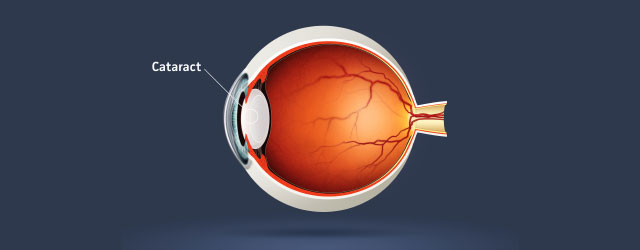Cataract
When the normal lens inside the eye, just behind the pupil, becomes cloudy this is referred to as a cataract. Cataracts are a normal part of ageing, commonly advancing to the extent where they affect the vision in a person’s 60s, 70s or 80s. They less commonly affect younger people, especially if there is a strong family history, there is previous trauma to the eye, or due to taking certain medication, especially Prednisolone.

(image source: http://www.medicaresolutions.com)
Cataracts can cause several visual problems:
- Blurred vision
- Problems with night driving
- Glare sensitivity
- Distorted vision
- An alteration in your glasses script
- Poor vision in bright or dull light
Cataracts are commonly removed. In fact, cataract extraction is one of the most commonly performed operations of any type. It is performed as day surgery, so patients can return home soon after the surgery is finished. Our surgeons perform the operation using topical anaesthetic drops so there are no injections around the eye, which is not only easier for the person having the operation, but safer. An anaesthetist is present for the operation to give the patient a sedative through an injection into a vein on their arm so they are as sleepy as they wish to be during the operation. The operation takes approximately 15 minutes to perform and there are usually no stitches.
When the cataract is removed a new plastic lens is placed into the eye in the same place from where the cataract was removed. This lens lasts indefinitely and doesn’t wear out or need to be replaced. No stiches are required to secure the lens into place as it is supported by the body’s normal lens support structures. The lens that is placed inside the eye is selected by our surgeons to suit each individual patient and can correct for pre-existing short-sightedness, long-sightedness and astigmatism.
After the operation the eye is covered with a clear protective shield and the patient can usually leave the hospital to return home within 2-3 hours from their admission. The eye is usually quite comfortable after the operation although some minor discomfort, irritation and wateriness the first night after the operation is common.
The shield is removed at a postoperative appointment the next day or as instructed by your surgeon and the vision is frequently significantly improved immediately. Eye drops are started at this first day postoperative visit and are used for the next 4 weeks.
Dr Cassidy and Dr Hart both perform cataract surgery at Victoria Parade Surgery Centre (VPSC), located on the first floor of the same building as our rooms (100 Victoria Parade, East Melbourne). This is a large eye surgery specialty hospital and has dedicated free parking for patients on the day of surgery. Dr Cassidy & Dr Hart also perform this surgery at Windsor Private Hospital.
In the spirit of reconciliation Eye Surgery Consultants acknowledges the Traditional Custodians of country throughout Australia and their connections to land, sea and community. We pay our respect to their Elders past and present and extend that respect to all Aboriginal and Torres Strait Islander peoples today.


